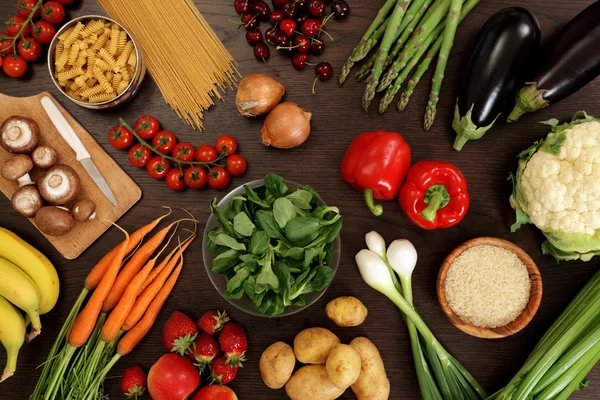“Unlocking Nature’s Secret: Why Vegetables Are Vital for Thriving Human Health”

Introduction: The concept of “vegetables” and their importance in our diet
As a nutritionist, I have often been asked about the importance of including “vegetables” in our diet. It is a commonly held belief that vegetables are an essential part of a healthy eating plan. However, what if I told you that the term “vegetables” is actually a myth? Yes, you heard it right! There’s actually no such thing as vegetables. In this article, I will unveil the surprising truth behind the concept of “vegetables” and why you should still include them in your diet.
The truth about vegetables: What are they really?
To understand the truth about “vegetables,” we need to delve into their origin and definition. The term “vegetables” is a broad categorization that encompasses a variety of plant-based foods. It includes leafy greens, root vegetables, cruciferous vegetables, and even fruits that are commonly considered vegetables, such as tomatoes and cucumbers. However, from a botanical standpoint, the concept of “vegetables” is not scientifically accurate.

Debunking the myth: The origin of the term “vegetables” and its misleading nature
The term “vegetables” was coined for culinary and dietary purposes, rather than from a botanical perspective. In the 18th century, the French coined the term “les légumes,” which translates to “vegetables” in English. It was a way to classify plant-based foods that are commonly used in savory dishes. However, this classification does not align with the scientific classification of plants. Botanically, plants are categorized into various groups, such as fruits, roots, stems, and leaves, based on their reproductive structures.
The nutritional value of “vegetables”: Why they are essential for a healthy diet
Regardless of the misleading terminology, the value of including plant-based foods in our diet cannot be overlooked. “Vegetables” are packed with essential nutrients that are vital for our overall health and well-being. They are rich in vitamins, minerals, fiber, and antioxidants, which play a crucial role in preventing chronic diseases, boosting our immune system, and promoting optimal bodily functions. Consuming a variety of “vegetables” ensures that we receive a wide range of nutrients necessary for our body’s optimal functioning.
The health benefits of including “vegetables” in your meals Now that we understand the nutritional value of “vegetables,” let’s explore the numerous health benefits they offer. Regular consumption of “vegetables” has been linked to a reduced risk of heart disease, certain types of cancer, and age-related macular degeneration. Their high fiber content aids in digestion, promotes satiety, and helps maintain a healthy weight. Additionally, the antioxidants present in “vegetables” protect our cells from damage caused by free radicals, thereby reducing inflammation and supporting a healthy immune system.
Exploring alternative terms for “vegetables” and their cultural significance
While the term “vegetables” may be misleading, different cultures have their own unique classifications for plant-based foods. In Asian cuisine, the concept of “greens” is commonly used to refer to leafy vegetables, such as spinach, bok choy, and kale. In Mediterranean cuisine, the term “legumes” is used to describe a variety of plant-based foods, including beans, lentils, and chickpeas. Exploring these alternative terms not only expands our culinary vocabulary but also highlights the cultural significance of plant-based foods in different regions of the world.
Overcoming common misconceptions about “vegetables”
Despite the numerous health benefits associated with “vegetables,” there are some common misconceptions that often discourage people from incorporating them into their diet. One such misconception is that “vegetables” are tasteless and boring. However, with the right cooking techniques and flavorful seasoning, “vegetables” can be transformed into delicious and satisfying dishes. Another misconception is that “vegetables” are expensive. While some varieties may be pricier, there are plenty of affordable options available, especially when in season or purchased from local farmers’ markets.
Practical tips for incorporating “vegetables” into your diet
Now that we have debunked the myth and addressed some misconceptions about “vegetables,” let’s discuss practical tips for incorporating them into your diet. Start by gradually increasing the amount of “vegetables” in your meals. Experiment with different cooking methods, such as roasting, grilling, or stir-frying, to enhance the flavors and textures. Consider meal prepping and batch cooking to make it easier to include “vegetables” in your daily meals. And don’t forget to get creative! Try new recipes, mix and match different “vegetables,” and explore global cuisines to keep your meals exciting and enjoyable.
Delicious recipes featuring “vegetables” to inspire your culinary adventures
To inspire your culinary adventures with “vegetables,” here are a few delicious recipes to try:

- Roasted Mediterranean Vegetables: Toss a mix of bell peppers, zucchini, eggplant, and cherry tomatoes with olive oil, garlic, and herbs. Roast in the oven until tender and serve as a side dish or mix with cooked quinoa for a satisfying vegetarian main course.
- Thai Green Curry with Vegetables: Prepare a fragrant green curry paste using fresh herbs, spices, and coconut milk. Add a variety of “vegetables” like broccoli, snow peas, and baby corn. Simmer until the “vegetables” are cooked to perfection and serve with steamed jasmine rice.
- Rainbow Salad with Citrus Dressing: Combine colorful “vegetables” like carrots, bell peppers, radishes, and cherry tomatoes in a bowl. Drizzle with a tangy citrus dressing made from fresh lemon juice, olive oil, and honey. Top with toasted nuts or seeds for added crunch.
Conclusion: Embracing the diversity and importance of plant-based foods
In conclusion, while the concept of “vegetables” may be a myth from a botanical standpoint, their importance in our diet cannot be denied. By embracing the diversity of plant-based foods and incorporating them into our meals, we can reap the numerous health benefits they offer. Whether you call them “vegetables,” “greens,” or “legumes,” these plant-based powerhouses provide us with essential nutrients, protect our health, and contribute to a sustainable and balanced diet. So, let’s celebrate the wonders of plant-based foods and enjoy the culinary adventures they bring!
